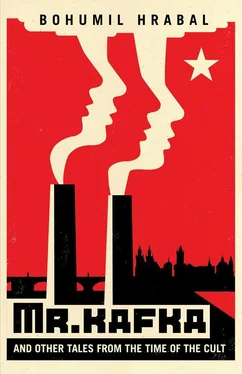“This place is no very nice at all,” said Ampolino. “At night, the girls here all go to sleep. Me, when I finish this work, I go home. At home, the girls don’t do nothing, and in the evening they all sing and make love. Hey, Frenchman, you agree wit’ me?”
“Go home,” said the Frenchman, “and don’t pay attention to what nobody says. Me, I figured this place was my new country, but I was wrong. I had to leave home because I got mixed up in antigovernment politics, but where I am gonna go now? We can make a living here, boys, but we can’t make a life. Out in the world people still know how to have a good time. In Singapore, in this little theatre, I see them let a pony have a go at a black girl. Or Shanghai? I see them boil a monkey alive and he goes crazy from the pain and it scrambles his brains, makes a tasty appetizer. Or Cuba? They let kids fool around with turtles before they kill them, and the kids poke their eyes out and the soup is ooh la la. And back home in France? At La Canebière, in Marseille, you sit around at tables and they have these crazy nonstop shows on a rickety stage, and you can get naked and so can your girl, then you put on these masks and get up on the stage and do it in any position you think of and the audience sitting there at the tables cheers you on… but look who’s coming!”
Vindy leaned over the vat and vanished into a cloud of turquoise vapor. He could be heard scraping away at the slabs of steel with a wire brush, and his voice was audible: “Okay now, your honor, just lower that hoist down and we’ll hook it up to the sling. The slag’s already been eaten away.”
The Judge, trusting to beginner’s luck, pressed a button, luckily the right one. The tackle descended into the sickly green vapor, and he heard the hook clank against the sling and the metal basket containing the slabs of steel. Vindy leaned over the vat, and only his trousers were visible.
“Far enough!” he commanded.
The Judge, like the king in a puppet show, released the controls, leaned into the acrid vapor, and fed the hook into the sling from the other side. But he couldn’t keep his head over the vat and straightened up abruptly. He emerged from the vapor holding his arms in front of him. All his mucous membranes were seared and burning; he was blinded by tears and he felt the acid making his nose run.
But Vindy, the assistant, whose membranes and sense of smell had long since been destroyed over the pickling bath, pressed the button, and the hoist raised the basket out of the vat. Hydrochloric acid ran off the slabs of steel, releasing more of its acrid fumes.
“They’re clean!” he shouted.
They turned and watched a tiny figure slowly approaching down the length of the long factory hall, lashed as he went by golden swatches of sunlight, as though he were walking beside a picket fence floodlit from the other side.
The man stopped and planted his hands on his hips. “Look here, comrades,” the shop steward said, “the imperialists are closing in and there’s no time to waste. We have to pour the molten steel of peace down their bellicose throats…”
“Hey, Václav,” said the Dairyman, “we’ve all read today’s editorial in Rudé Právo , too. There’s a different issue here. Why don’t you consult us before you raise the production quotas? Whatever happened to proper procedure?”
“All very well,” said the steward, squaring his shoulders, “but what you’re doing is called a strike.”
“What if it is? The constitution allows us to strike. So yeah, constitutionally, we’re on strike. We’re not working until the one who’s supposed to negotiate higher quotas shows up.”
“But there’s a war on in Korea right now,” said the steward, raising his voice. “Pusan is about to fall. For the last time, are you going to get this shuttle moving?”
“No, we’re not!”
“All right,’ said the steward, “I’ll have to report this to the manager,” and he walked away, while the louvered ventilation tower cast stripes of light, like a prison uniform, across his back.
A breeze carried away the veil of greenish vapor, and Vindy leaned over the stack of metal slabs, while the Judge removed one of his gloves and placed his hand on the wet steel.
“Your honor,” said Vindy, “wipe that stuff off right away! Give it a rinse, quick!”
The Judge hurried along a tottering plank, turned on the tap, but then he slipped and fell up to his crotch in a space between the board and one of the hoppers. He quickly freed himself, though he could tell he’d injured his knee, but he rinsed his hands and looked over at the scrap pile just as a young woman wearing a prison uniform appeared. Her left arm was in a fresh cast, and with her right hand she grabbed an ox bridle, carried it to the hopper, and tossed it in, just as the other convicts were about to add the last of the crucifixes.
“And a-one, and a-two and a-three,” cried a female voice.
The crucifix arced through the air, and one of the convicts jammed the figure of Christ hanging from it into the pile of scrap with both hands.
“She’s doing time for going over the hill, trying to escape the country,” Vindy explained. “Yesterday she got her arm caught in something. But listen here, do you know that when Nezval was just a kid he dragged angels into his poems?”
“Say again?” asked the Judge.
“Maybe he’s a Jew,” the assistant went on. “Seems to me these days his poetry exudes the spirit of the synagogue, of the Antichrist. They say that when he was born the Archangel Gabriel stood over his crib. So if he doesn’t believe in Gabriel, why did he drag that angel into it?”
“No idea,” said the Judge, “but it seems to me that the acid has all drained off.”
“Right, so I’ll just shift the load a little. But I’m going to have to dispel the shadow of Freemasonry myself,” Vindy said, spitting out a long string of saliva. “I’ll write a poem and call it ‘How Brother Victor Ahrenstein Carved a Block of Stone by Proxy.’”
“Boys, he’s going to throw the book at us,” said the Restaurateur.
“No, he won’t,” said the Dairyman. “If we don’t get any satisfaction, I’ll go see Poncar. And if he won’t help, I’ll go straight to the top, to Tonda. Wasn’t it Tonda who taught us to stand up for our rights as workers?”
“If someone wants you to walk a mile with them, walk two,” said the Priest, “and if he asks for your shirt, give him your coat as well. ..”
“Yeah, and if someone strikes you on one cheek, turn the other,” the Dairyman interrupted him. “Good advice for a saint, but a worker? If he doesn’t go straight for the solar plexus, he’s doomed.”
“We’ve already turned the Church upside down, and there’s more to come,” said the curly-haired Cop.
“Maybe that’s just what will get the Church back on its feet,” the Priest said.
“Maybe, but I’m telling you, in fifty years, there’ll be nothing left of the Church but the churches.”
The Sergeant Major got to his feet, opened a notebook to the sunlight, and said, “Lay off, the holy father here is the only one who’s got his head screwed on, but today, I’m going to have to put a big fat zero in my notebook, because that’s exactly what they’ll pay us for just standing around. So, Mr. Prosecutor, how much time could we be looking at for this?”
“I’m working on it,” said the State Prosecutor, pacing up and down. “They could hit us with the Defence of Public Order law. That one has bigger maximums.”
“But the law’s on our side,” said the Dairyman.
“It might be on your side,” said the State Prosecutor, “but it’s not on mine, because I was tossed out of my job. Of course, if I were still a prosecutor, I could turn all this into a nice little antigovernment conspiracy. I’d accuse myself of being the intellectual mastermind behind this strike, and, as an additional incriminating factor, I’d add that as a former state prosecutor, I knew it was a crime and should have reported it. ..”
Читать дальше












